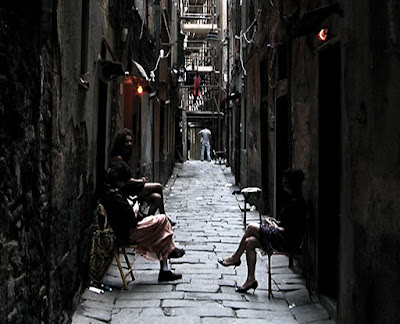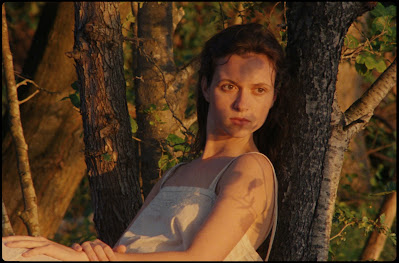Lincoln Center described Pietro Marcello as “quietly redefining contemporary Italian cinema.” While the filmmaker says that the neorealist masterpieces of Vittorio De Sica have moved him to tears, he has charted a dramatically different course while drawing deeply from those cinematic roots.
Born in 1976 in Caserta, Italy, Marcello attended Naples’ renowned Academy of Fine Arts, where he studied painting. Finding himself drawn to storytelling, he launched the radio program “Il tempo dei Magliari” and began experimenting with documentaries. “Carta” and “Scampia” were among his first short films.
In 2004, he completed the documentary “Il cantiere,” which was awarded the top prize at the 11th edition of the Libero Bizzarri Film Festival, a celebration of cinema named after the late journalist and screenwriter.
Marcello took it to the next level in 2007 when the Venice Film Festival premiered his documentary “Il Passaggio della Linea” (Crossing the Line). The poetic journey across Italy, which reveals the decay of the once-vibrant routes and landscapes of the country’s long-distance express trains, established him as an up-and-coming auteur. Since then, his unique style has emerged in the visual symphonies that are his films. At times subtle and reflective and at others forceful and lively, they tell gripping tales with often explosive conclusions while following beautifully flawed characters trying to navigate life.
His 2009 docu-fiction “La bocca del lupo” (The Mouth of the Wolf) follows Enzo as he returns to Genoa after a lengthy absence to reunite with his love, Mary, a convict just released from prison. Upon Enzo’s return, he explores the urban streets, searching for familiar places from his past, only to discover an unrecognizable city. He finds solace in knowing that Mary waits for him at their quaint house in the ghetto, but even she has changed and is now in the grips of drug addiction. Marcello takes this complex, dark story and transforms it into a poetic tale filled with love, hope, and nostalgia.
Marcello’s 2011 film “The Silence of Pelesjan” is a visually dynamic tribute to the esteemed Armenian filmmaker Artavazd Pelešjan. It premiered at the Venice Film Festival in the Orrizonti section and was later awarded a Nastro d’Argento by the Italian National Syndicate of Film Journalists for best documentary on cinema. Using his trademark technique of montages and simulated archival footage to showcase excerpts from Pelešjan’s works, Marcello paints a wondrous portrait of the mysterious director who lives a life of solitude. Known for his experimentation with distance editing, which involves extreme longshots and panoramic views of everything from cities to galaxies, Pelešjan’s films focus more on theme than plot. Marcello captured this concept perfectly in an imaginative, ethereal homage to an artist who created abstract film masterpieces.
The drama “Lost and Beautiful,” which was released in 2015 to worldwide acclaim, takes the viewer on a roller coaster ride of emotions, achieving a mystical ambiance by shooting a heartfelt story on expired 16 mm film stock. Tommaso, a revered shepherd, volunteers to stand guard at Caserta’s abandoned Royal Palace of Carditello during a tumultuous time of mafia clashes. While there, he suffers a heart attack and dies. Before he goes, he begs the commedia dell’arte character Pulcinella to rescue a buffalo calf from the palace. After agreeing to grant the dying man’s wish, Pulcinella and the calf, named Sarchiapone, embark on a fantastical adventure north. Through the narration of actor Elio Germano, we see the world through Sarchiapone’s eyes as he ponders the cruelty of humankind and the slaughterhouse that awaits him. The heart-rending journey and tear-jerking end make for unforgettable cinema.
Marcello’s next film came in 2019 with the international art-house favorite “Martin Eden.” Starring Luca Marinelli in the title role, the movie was adapted from Jack London’s 1909 novel about an unskilled laborer following his dream of becoming a writer. Marcello changed the setting to Southern Italy.
When Martin meets Elena, the well-educated daughter of a wealthy industrial family, he falls in love and hopes that fulfilling his dream will help him rise to the social status of Elena’s family. Determined to win her hand in marriage, he pursues an education that was traditionally unattainable for someone of his social class. That’s when he strikes up a friendship with a left-wing intellectual, who leads him down a different path to a life-changing cultural awakening.
The moral of the story is that second chances are possible for those who live everyday life rather than pursue a privileged education, making the story timeless and the life lessons relevant today. It was an important story for Marcello to tell, being from Southern Italy and following in the footsteps of literary giants like Carlo Levi and Pier Paolo Pasolini, who themselves walked a very different path from the North American counterparts who influenced London. Marcello, who also wrote the film, was awarded a David di Donatello for best-adapted screenplay.
Check out this clip of Pietro Marcello talking with us about "Martin Eden"...
Directed by Marcello, Francesco Munzi and Alice Rohrwacher, 2021’s “Futura” is a collective effort geared toward the country’s youth. The film consists of interviews filmed during an odyssey across Italy to understand the concerns, dreams, expectations, and fears of Italian teenagers. When asked what they want out of life, the teenagers shed light on the new generation but also prove that, regardless of age, ethnicity or gender, people are people, and we all want the same things: a good job, a loving family and freedom. The nearly two-hour-long film made its way through film festivals throughout the world, presenting an authentic glimpse into Italy’s future.
Marcello’s latest project, “L’envol” (Scarlet), just opened at Lincoln Center. Shot in France, it is based on the 1923 novel by Russian author Alexander Grin. The film opens with a soldier returning from World War I to his home in a rural village. He learns that his wife died while he was away, leaving him to raise his baby daughter, Juliette. Despite the challenges the two face, Juliette grows into a beautiful, free spirit with a zest for music and singing. One day, she meets an old sorceress who offers a prediction, and shortly after, Juliette meets a mysterious young man and is overcome by love. Like Marcello’s other films, “L’envol” contains scenes that mimic archival footage, lending the film contrasting elements of folklore and realism. He captures the timelessness of a story written a century ago while making characters and situations relatable in our contemporary world.
Marcello is also bringing his attributes as an old soul with a modern eye to bear on his next project, “I promessi sposi” (The Betrothed). A film adaptation of Alessandro Manzoni’s 1827 historical novel, it will explore the conflicts between church and state in Northern Italy under Spanish rule in the 1620s.
Most of the aforementioned films are available online. Click on the titles for direct links to stream them. "Scarlet" is playing at Lincoln Center through June 22. Click here for details. Follow Marcello’s adventures in filmmaking on Instagram at @avventurosae.
-Written by Jeannine Guilyard for the July 2023 issue of Fra Noi Magazine. Click here to subscribe.






Comments
Post a Comment